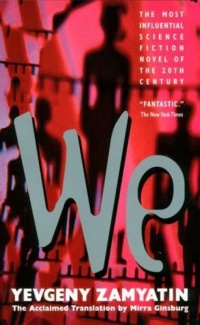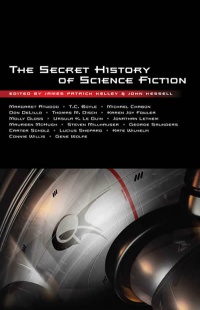You will subjugate the unknown beings on other planets, who may still be living in the primitive condition of freedom, to the beneficent yoke of reason. If they fail to understand that we bring them mathematically infallible happiness, it will be our duty to compel them to be happy.
Title: We
Author: Yevgeny Zamyatin
Year: 1924
Rating: 4 stars
 When you think of the great dystopian novels of the twentieth century, there are a few that will come to everyone’s mind. Zamyatin’s We, however, may not be one of them, for the simple reason that many people don’t know about it. (I had never heard of it until about a year ago.) Depending on one’s personal tastes, the book may or may not measure up to the quality of those other, more widely known, dystopian works; nevertheless, We is worthy of attention for its stark depiction of social conformity and control taken to an extreme. Zamyatin’s credibility in writing this type of novel is hard to dismiss. As a Russian writer working during an age of revolutionary upheavals, and having spent time in prison under two different regimes, Zamyatin witnessed first-hand the brutality that can result from the flawed human urge toward utopia-building.
When you think of the great dystopian novels of the twentieth century, there are a few that will come to everyone’s mind. Zamyatin’s We, however, may not be one of them, for the simple reason that many people don’t know about it. (I had never heard of it until about a year ago.) Depending on one’s personal tastes, the book may or may not measure up to the quality of those other, more widely known, dystopian works; nevertheless, We is worthy of attention for its stark depiction of social conformity and control taken to an extreme. Zamyatin’s credibility in writing this type of novel is hard to dismiss. As a Russian writer working during an age of revolutionary upheavals, and having spent time in prison under two different regimes, Zamyatin witnessed first-hand the brutality that can result from the flawed human urge toward utopia-building.
The novel takes place some six hundred years in the future and is set within the One State, a society that denies human individuality, imagination, and spontaneity, and puts in their place an ideal of rigid conformity and mathematical precision in all aspects of life. For example, here is how the members of the One State create music:
“Simply by turning this handle, any of you can produce up to three sonatas an hour. Yet think how much effort this had cost your forebears! They were able to create only by whipping themselves up to fits of ‘inspiration’ — an unknown form of epilepsy.”
In the One State, there are no names; people are identified by numbers, or generically referred to as “unifs” (uniforms). These unifs go about their daily lives according to the Table of Hours, which tells them when to work, when to sleep, when to take recreation, even when to have sex. All buildings are constructed of glass, so that everyone can see what everyone else is doing and there’s no way to hide anything. The city is surrounded by the Green Wall which keeps out the chaotic force of Nature, and everything is designed with straight lines and right angles; there’s no deviance from mathematical perfection. When people walk through the streets, they walk in exact formation, in groups of four, at the same pace. And all this is watched over by the Benefactor (a dictator unanimously “elected” every year) and the Guardians (his secret police). Anyone who defies the social order meets their end on the Benefactor’s Machine, while the crowds look on approvingly and poets recite odes of praise for the event. The One State is predicated on the idea that happiness and freedom are at odds, and that freedom is the more expendable of the two:
Just think! Those two, in paradise, were given a choice: happiness without freedom, or freedom without happiness. There was no third alternative. Those idiots chose freedom, and what came of it? Of course, for ages afterward they longed for the chains. The chains — you understand? That’s what world sorrow was about. For ages! And only we have found the way of restoring happiness….
This denial of freedom is entirely acceptable to most unifs. Few of them can even conceive of the idea of their rights being violated, since the very concept of rights is seen as “one of the absurd prejudices of the ancients.” Individualism is nothing, collectivism is everything. The book takes its title from a brief summation of the basic attitude of collectivist societies: “‘We’ is from God, and ‘I’ from the devil.”
The story is told in a diary format by D-503, the lead engineer working on the Integral, the One State’s first spaceship. This ship is to travel to other worlds and spread the message about how great their society is, by force if necessary (see quote at top of review). A group of underground rebels conceive the idea of stealing the Integral on launch day and making an escape. So they target D-503 and try to tempt him into joining them. He falls in love with one of them, I-330 — a big no-no since love is a primitive and uncivilized emotion — and finds himself becoming more and more open to their point of view. Most of the book is about D-503’s agonizing battle with himself, as he yearns for freedom, while at the same time feels disgusted with himself for betraying the One State. He flip-flops on the issue over and over, but gradually he comes to see the serious flaws in his society. When people are told to gather in the auditoriums to undergo a new operation to remove the part of the brain that controls imagination, D-503 observes some of the first patients:
In the auditorium in the corner the door is gaping wide, and a slow, heavy column of some fifty people emerges. “People?” No, that does not describe them. These are not feet — they are stiff, heavy wheels moved by some invisible transmission belt. These are not people — they are human tractors.
Eventually D-503 is also forced to submit to this operation, which solves his indecision once and for all. At that point he watches his love, I-330, tortured and executed, but just like the other “human tractors,” it doesn’t bother him at all.
George Orwell published a review of We (which you can read here) in 1946, three years before the publication of 1984, in which he theorizes that Zamyatin’s novel was an influence on Huxley’s Brave New World. That’s probably true, but it also seems very likely that Orwell himself drew some degree of influence from the book. For example, Zamyatin’s One State refers to an execution as a “celebration of Justice” — sounds a lot like Newspeak, doesn’t it? At any rate, I have to agree with Orwell’s general opinion of the book: that it’s full of political and social ideas relevant to the modern world, but that the plot is not quite as strong as it could have been. Also, even though We seems pointed at conditions in Russia, and is eerily predictive of the horrors of Stalinism to come later, I also tend to agree with Orwell that Zamyatin’s focus was probably meant to be broader than that. Orwell describes the book as a response to “the implied aims of industrial civilization…. a study of the Machine, the genie that man has thoughtlessly let out of its bottle and cannot put back again.” Look at the shutting out of nature, the rigid obeisance to the clock, the propagandist terminology….. this novel speaks to various problems ranging all over the modern world, not just to those parts ruled in a totalitarian manner. We is a thought-provoking novel still very relevant almost 90 years later, and it should get more attention than it does.















